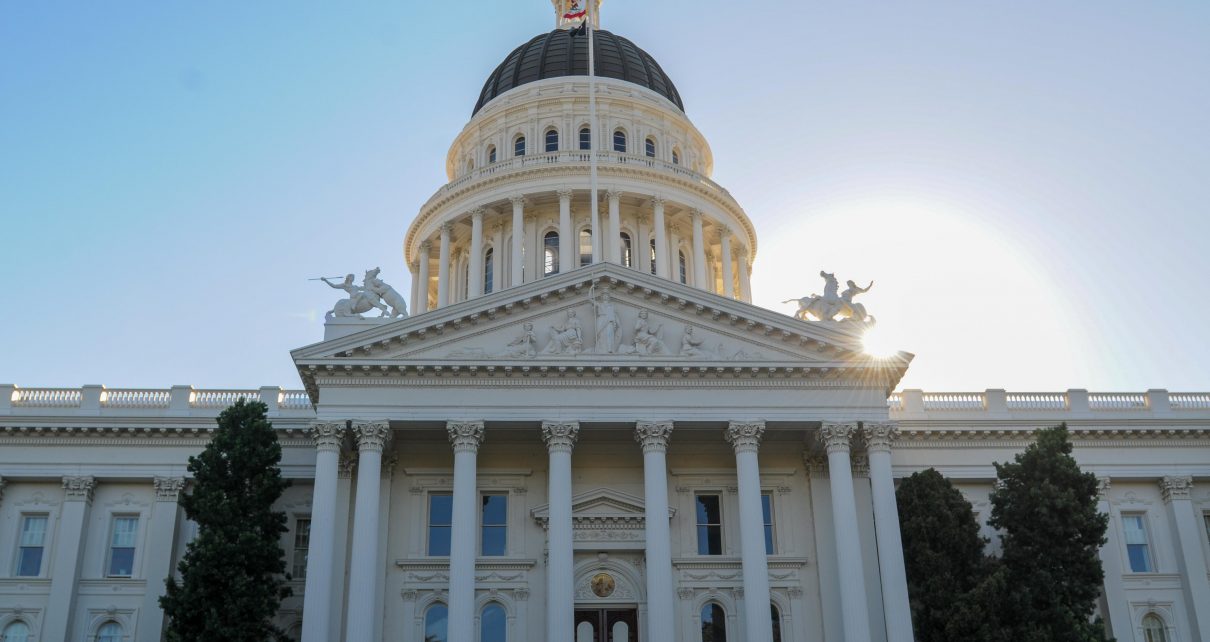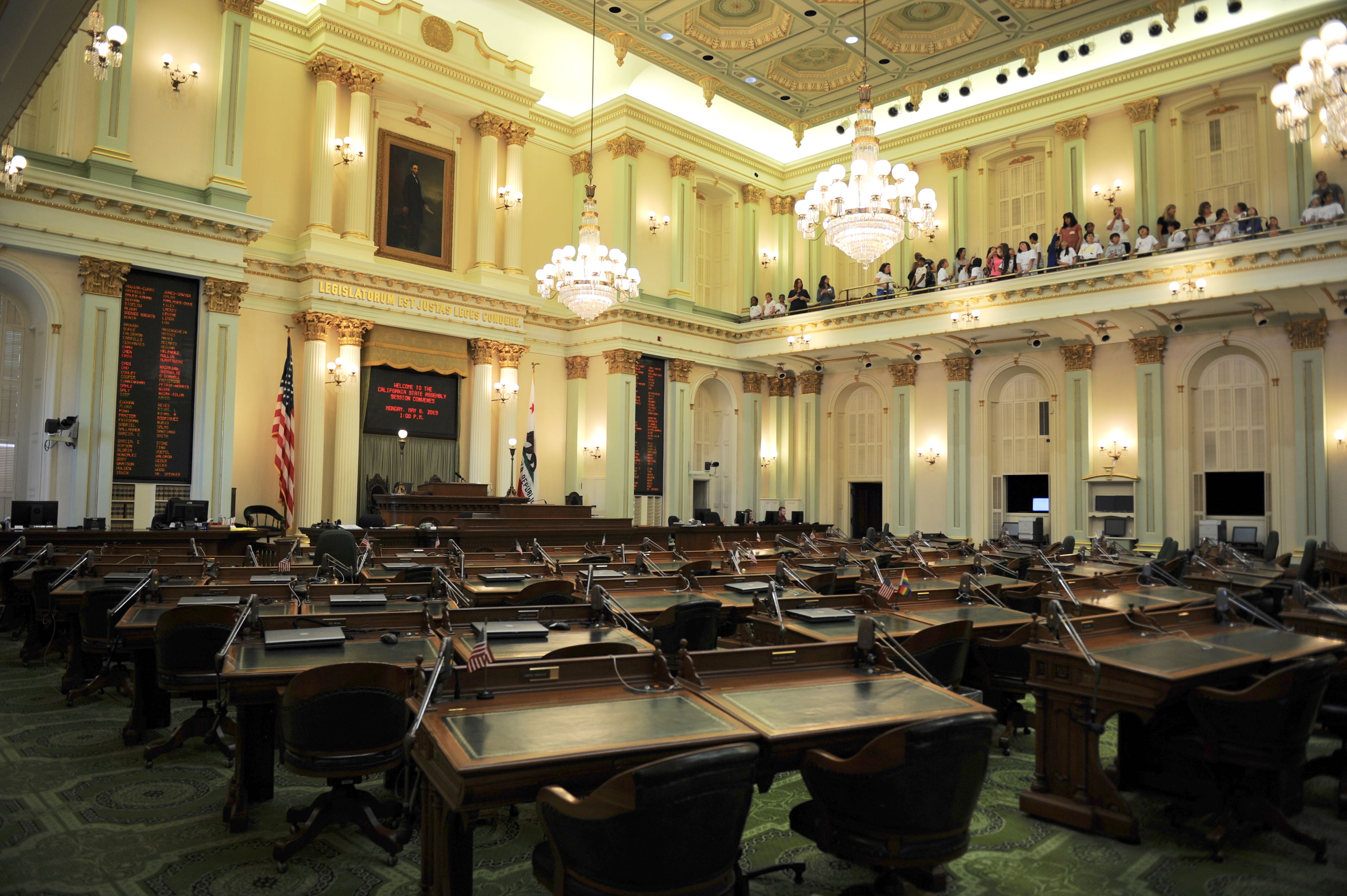
California State Capitol. (Photo: Kevin Sanders for California Globe)
California Courts and Urgency Clauses in Statutes
Urgency clause measures in the California Legislature are one of four types of bills that take effect immediately
By Chris Micheli, December 18, 2024 2:30 am
Urgency clause measures in the California Legislature are one of four types of bills that take effect immediately upon the Governor’s signature, rather than the standard January 1 following the bill’s enactment. So, how have the California courts interpreted bills with urgency clauses?
In Busch v. Turner (1945), an urgency clause of a 1945 statute was challenged as being invalid under the constitutional prohibition that provides, in part, “no measure creating or abolishing any office or changing the salary, term or duties of any officer … shall be construed to be an urgency measure.” In this case, the plaintiff argued that, if the 1945 act is given the effect for which the petitioner contends, it would constitute a measure changing his salary.
The court ruled, however, that the statute does not by its terms change salaries. It purports merely to exercise the authority granted the Legislature by the 1944 amendment to suspend temporarily the prohibition contained in section 5 of article XI. The increase in salary of the District Attorney of Lake County was made by the legislation of 1943 and, although passage of the 1945 act constituted the final event making the increase applicable to petitioner, this only resulted indirectly from removal of the constitutional prohibition.
Since the act does not directly purport to change salaries, the court explained, “we may properly consider it in light of the purposes underlying the rules governing urgency measures… Prior to the adoption of the referendum system in 1911, the Constitution contained no provision precluding immediate operation of statutes, and the effective dates of the statutes were determined by the Legislature.”
Another court case demonstrates the actual timing of an urgency statute taking “immediate effect.” In this case, the “three strikes” statute was effective immediately when it was signed by the Governor and transmitted to the Secretary of State and, thus, it applied to the defendant who was arrested approximately seven and one-half hours on the same date, despite the contention that the term “immediately” in statute meant the next day. People v. Cargill (1995) 38 Cal.App.4th 1551, rehearing denied, review denied
As the court explained, “This case illustrates the wisdom of the commonly-used phrase, ‘Timing is everything in life.’ In this instance, appellant Bartholemew Cargill was arrested in the possession of cocaine base at about 10:15 p.m. on March 7, 1994. That rather uneventful statistical fact becomes more important in light of the action at 2:45 p.m. on the same day in Sacramento when the Governor signed and filed with the Secretary of State the new ‘three strikes’ law.
“Cargill challenges the application of the three strikes law to him on two grounds; first, that the law did not go into effect until after his arrest and, even if the law were applicable, it did not provide him adequate notice and therefore denied him due process of law. We reject both contentions.
“The bill (AB 971) which amended Penal Code section 667 to add the so-called three strikes provisions was signed by the Governor and filed with the Secretary of State at 2:45 p.m. on March 7, 1994. (Stats.1994, ch. 12.) Section 2 of the bill contains the statement, ‘This act is an urgency statute necessary for the immediate preservation of the public peace, health, or safety within the meaning of Article IV of the Constitution and shall go into immediate effect.’ (Stats.1994, ch. 12, § 2.)”
Since the statute in this case was passed as an urgency measure, its effective date is controlled by Government Code Section 9600, which provides in part, “Statutes calling elections, statutes providing for tax levies or appropriations for the usual current expenses of the state, and urgency statutes shall go into effect immediately upon their enactment.” In this case, the statute was enacted when it was passed by the Legislature, signed by the Governor, and forwarded to the Secretary of State. (In re Thierry S. (1987) 19 Cal.3d 727, 738–739)
The appellate court explained its reasoning that, “according to the statute, the law is effective ‘immediately’ upon its enactment. ‘Immediate’ is a common term defined as ‘occurring or accomplished without delay; instant.’ (Random House Dict. of the English Language (2d ed. 1983) p. 956.) Plainly, the three strikes law, an urgency measure, went into effect at the time it was filed by the Governor with the Secretary of State and was validly in place when Cargill committed the current offenses.”
In the case of People v. Camba, 50 Cal.App.4th 857 (1996), the appeals court addressed the state constitutional requirements for urgency measures, including a second roll call vote for adoption of an urgency statute. In this case, the court ruled that the second roll call was not needed to approve the urgency clause of bill reducing percentage of days of pre-conviction confinement that may be used in calculating sentence credits, even though the bill returned to its house of origin in a drastically amended form.
The court explained that the “legislature’s determination of urgency in enactment of statute is final, and courts will not interfere with that determination unless no declaration of facts constituting an emergency is included in act or unless statement of facts is so clearly insufficient as to leave no reasonable doubt that urgency does not exist. Recitals of necessity and public interest in legislation must be given great weight and every presumption made in favor of their constitutionality.”
In rendering its decision, the court of appeal took judicial notice of the Joint Rules of the Senate and Assembly concerning urgency measures. The court said that the state constitutional requirements for urgency measures were not violated when the legislature mistakenly referred to “repeat offenders” in making an urgency determination in the initial stages of the passage of the bill, rather than referring to “all violent felony offenders” as stated in the bill as ultimately enacted.
The appellate court went on to explain that, if the legislature states facts constituting an emergency so that its action cannot be said to be arbitrary, courts cannot say that legislature has not performed its constitutional duty, even though they may disagree with the legislature about whether the declared facts constitute sufficient reason for immediate action.
The courts in California interpret their review of an urgency clause as being limited. “We are severely constrained in our review of the section 2933.1 urgency clause. ‘Authority is conferred upon the legislature to determine when urgency measures are necessary, and when such necessity has been determined as provided by the Constitution, the judgment of the legislature is final, and will not be interfered with by the courts unless no declaration of facts constituting such emergency is included in the act or unless the statement of facts is so clearly insufficient as to leave no reasonable doubt that the urgency does not exist. (Hollister v. Kingsbury (1933), 129 Cal.App. 420)’ (Livingston v. Robinson (1938) 10 Cal.2d 730, 740; see also Davis v. County of Los Angeles (1938) 12 Cal.2d 412, 420–421) “The recitals of necessity and public interest in legislation must be given great weight and every presumption made in favor of their constitutionality (Monterey County Flood Control & Water Conservation Dist. v. Hughes [(1962)] 201 Cal.App.2d 197, 209).” (Azevedo v. Jordan (1965) 237 Cal.App.2d 521, 526)”
“[I]f the legislature “states facts constituting an emergency so that its action cannot be said to be arbitrary, courts cannot say that it has not performed its constitutional duty, even though they may disagree with the legislature as to the sufficiency of declared facts to constitute a sufficient reason for immediate action.” (Baker v. Hill [(1929)] 180 Ark. 387)’ (Davis v. County of Los Angeles, supra, 12 Cal.2d at pp. 422–423)” (Behneman v. Alameda–Contra Costa Transit Dist. (1960) 182 Cal.App.2d 687, 692) Given our exceedingly limited reviewing function, we must conclude that the mistaken reference to repeat, rather than all, offenders does not render erroneous the Legislature’s finding and declaration of the need to protect the public by immediately implementing the credit reduction scheme of section 2933.1 to forestall the early release of dangerous criminals under previously existing law.”
What happens when there is an urgency clause, as well as a “delayed operative date” in the new statute? This issue was addressed in the case of People v. Palomar, 171 Cal.App.3d 131 (1985). In this case, the statute provided for the imposition of a restitution fine for felony offenders that did not become operative until January 1, 1984, pursuant to the operative clause
of the entire act, and so the appellate court ruled that the statute could not be retroactively applied to offense occurring before that date, despite the urgency clause which provided that statute went into effect immediately upon its enactment.
The appeals court explained that, “This legislation was adopted as an urgency measure and was filed with the Secretary of State on September 27, 1983. (Stats.1983, ch. 1092, § 426.) By virtue of the urgency clause the statute went ‘into effect’ immediately upon its enactment, September 27, 1983. (Gov.Code, § 9600, subd. (b); Cal. Const., art. IV, § 8, subd. (c)(1).) However, the legislation further provided that “[t]his act shall become operative January 1, 1984.” (Stats.1983, ch. 1092, § 427; emphasis added.)
“That does lead to the question: why would the Legislature have gone to the trouble of adopting an urgency clause only to put into effect a later operative date? We really don’t know. The Legislature built the structure and that is the last brick they laid. We conclude that Penal Code section 1202.4 did not affect the rights of individuals until January 1, 1984, the operative date of the act and cannot retroactively be applied to any offense occurring before that date. (See Fox v. Alexis (1985) 38 Cal.3d 621)
“The Legislature may specify the legal effects to be attached to the operative clause. For example, it may specify that a statute will become operative upon the occurrence of a contingency (Busch v. Turner (1945) 26 Cal.2d 817, 821) or it may specify that some part of a statute will become operative at a date after the date the statute takes effect (See 2 Sutherland, Statutory Construction, supra, § 33.08, p. 14.) In Johnston v. Alexis, supra, 153 Cal.App.3d 33, the Legislature attached an urgency clause to an enactment raising vehicle license fees, stating that its purpose in doing so was to enable the agencies charged with transportation planning to estimate the funds that would be made available. At the same time it attached a clause making some of the provisions of the enactment operative on a later date. Among these was a provision for an increase in the basic vehicle registration and commercial weight fees. The court applied these differential provisions of the legislation as provided by the enactment.”
Finally, is there a right to a referendum (one of the people’s powers of direct democracy) with all types of legislation? The appeals court addressed this in the case of People v. Benard, 129 Cal.App.3d 841 (1982). Here, the court determined that, on August 11, 1977, the Legislature enacted as an urgency statute the legislation under which defendant was convicted and sentenced. (Stats.1977, ch. 316, § 26, p. 1266.) Because of the urgency clause, the statute went into effect immediately upon its enactment instead of on January 1, 1978.
According to the court, “Defendant’s first argument is that the urgency clause was invalid because it precluded a referendum on a death penalty law, the possibility of such referendum being constitutionally required. Defendant is correct that the 1977 statutes, being urgency legislation, could not have been subject to a referendum. Section 9(a) of article II of the California Constitution states that ‘[t]he referendum is the power of the electors to approve or reject statutes or parts of statutes except urgency statutes ….’ (Emphasis added.) However, defendant is incorrect that the Constitution gives the electors the right to seek a referendum on all death penalty legislation.”
What happens if the urgency clause is deemed to be invalid by a court in this state? “If the urgency clause of legislation is found constitutionally unsound, the remainder of the statute is nonetheless valid, and it takes effect ‘at the regular time appointed by law. [Citations.]’ (People v. Phillips (1946) 76 Cal.App.2d 515)
- Pacific Marine Fisheries Compact - February 24, 2026
- Relations of LLC Members and Managers - February 24, 2026
- This Is an Interesting Limit on Rulemaking Power - February 23, 2026





One thought on “California Courts and Urgency Clauses in Statutes”